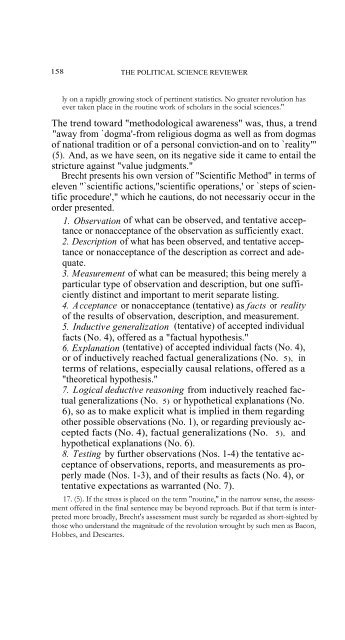ARNOLD BRECHT'S POLITICAL THEORY REVISITED Political ...
ARNOLD BRECHT'S POLITICAL THEORY REVISITED Political ...
ARNOLD BRECHT'S POLITICAL THEORY REVISITED Political ...
You also want an ePaper? Increase the reach of your titles
YUMPU automatically turns print PDFs into web optimized ePapers that Google loves.
158 THE <strong>POLITICAL</strong> SCIENCE REVIEWER<br />
ly on a rapidly growing stock of pertinent statistics. No greater revolution has<br />
ever taken place in the routine work of scholars in the social sciences.''<br />
The trend toward "methodological awareness" was, thus, a trend<br />
"away from `dogma'-from religious dogma as well as from dogmas<br />
of national tradition or of a personal conviction-and on to `reality"'<br />
(5). And, as we have seen, on its negative side it came to entail the<br />
stricture against "value judgments."<br />
Brecht presents his own version of "Scientific Method" in terms of<br />
eleven "`scientific actions,"scientific operations,' or `steps of scientific<br />
procedure'," which he cautions, do not necessariy occur in the<br />
order presented.<br />
1. Observation of what can be observed, and tentative acceptance<br />
or nonacceptance of the observation as sufficiently exact.<br />
2. Description of what has been observed, and tentative acceptance<br />
or nonacceptance of the description as correct and adequate.<br />
3. Measurement of what can be measured; this being merely a<br />
particular type of observation and description, but one sufficiently<br />
distinct and important to merit separate listing.<br />
4. Acceptance or nonacceptance (tentative) as facts or reality<br />
of the results of observation, description, and measurement.<br />
5. Inductive generalization (tentative) of accepted individual<br />
facts (No. 4), offered as a "factual hypothesis."<br />
6. Explanation (tentative) of accepted individual facts (No. 4),<br />
or of inductively reached factual generalizations (No. 5), in<br />
terms of relations, especially causal relations, offered as a<br />
"theoretical hypothesis."<br />
7. Logical deductive reasoning from inductively reached factual<br />
generalizations (No. 5) or hypothetical explanations (No.<br />
6), so as to make explicit what is implied in them regarding<br />
other possible observations (No. 1), or regarding previously accepted<br />
facts (No. 4), factual generalizations (No. 5), and<br />
hypothetical explanations (No. 6).<br />
8. Testing by further observations (Nos. 1-4) the tentative acceptance<br />
of observations, reports, and measurements as properly<br />
made (Nos. 1-3), and of their results as facts (No. 4), or<br />
tentative expectations as warranted (No. 7).<br />
17. (5). If the stress is placed on the term "routine," in the narrow sense, the assessment<br />
offered in the final sentence may be beyond reproach. But if that term is interpreted<br />
more broadly, Brecht's assessment must surely be regarded as short-sighted by<br />
those who understand the magnitude of the revolution wrought by such men as Bacon,<br />
Hobbes, and Descartes.
















